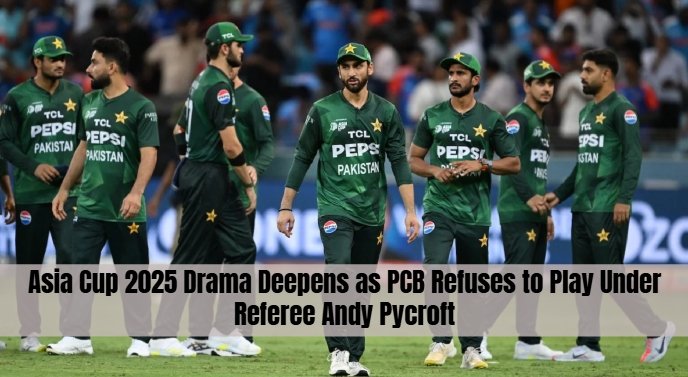The 2025 ACC Men’s T20 Asia Cup, meant to be a celebration of Asian cricketing talent, has instead turned into a storm of controversy, boycotts, and high drama. What started as an unusual moment after the India-Pakistan clash on 14 September has now escalated into a full-blown standoff between the Pakistan Cricket Board (PCB) and the International Cricket Council (ICC), with Pakistan threatening to pull out of the tournament.
The Handshake That Never Happened
The spark was lit during the highly anticipated Pakistan-India group-stage match. After India’s victory, Indian players, including captain Suryakumar Yadav and all-rounder Shivam Dube, celebrated among themselves but deliberately avoided the customary handshake with Pakistani players. The Pakistani side, in turn, shook hands only with their own teammates before walking off the field.
This breach of cricketing etiquette raised immediate questions about the spirit of the game, and Pakistani officials accused match referee Andy Pycroft of mishandling the situation. Pakistan captain Salman Ali Agha added fuel to the fire by skipping the post-match presentation ceremony, signaling growing tensions between the two camps.
Pycroft at the Centre of the Storm
The PCB believes referee Pycroft was not only negligent but actively biased in handling the incident. According to board sources, Pycroft pre-guided match conduct “against the spirit of cricket,” undermining fair play.
The PCB swiftly wrote to the ICC requesting Pycroft’s replacement. However, their first letter was rejected, which only intensified frustrations in Lahore. The board accused the ICC of carrying out a “formality inquiry” without thoroughly reviewing evidence or consulting those directly involved.
Unmoved, PCB chairman and Asian Cricket Council (ACC) president Mohsin Naqvi doubled down, penning a second letter to the ICC. The board made it clear: Pakistan will not play under Pycroft’s supervision.
The Boycott Threat
Matters escalated dramatically on Wednesday, just hours before Pakistan’s final group-stage match against the United Arab Emirates (UAE) at the Dubai International Cricket Stadium.
The Pakistan team bus was stationed outside the hotel, ready to depart for the ground at 5 PM PST. Yet, the players never emerged. Sources confirmed that the squad was instructed to remain inside, effectively boycotting the fixture.
With less than a few minutes to go before the scheduled 7:30 PM (PST) start, uncertainty gripped the tournament. UAE players had arrived at the stadium, but Pakistan’s absence made it clear that cricket was no longer the focus, politics and power struggles had taken over.
Mohsin Naqvi’s Press Conference
Amid the drama, PCB chairman and ACC president Mohsin Naqvi announced a press conference at the Gaddafi Stadium in Lahore to clarify Pakistan’s stance. According to insiders, Naqvi plans to make Pakistan’s continued participation in the Asia Cup conditional upon Pycroft’s removal.
“The board has taken a firm stance. We will not compromise on the spirit of cricket. The Asia Cup cannot continue as if nothing happened,” a senior PCB official told reporters.
ICC on the Back Foot
The ICC now faces a major crisis. With Pakistan refusing to take the field, the governing body risks losing not only a major tournament participant but also the credibility of its officiating system. Reports suggest ICC officials are scrambling to manage the fallout, though no official statement has yet been released.
For now, the Asia Cup remains in limbo. While India has already qualified for the Super Four stage, Pakistan’s boycott could drastically alter the tournament’s dynamics. UAE, fresh from their win over Oman, were eyeing an upset against Pakistan, but the result may be decided in boardrooms rather than on the pitch.
A Drama Bigger Than Cricket
This isn’t the first time cricket between India and Pakistan has been overshadowed by off-field controversies. From venue disputes to broadcasting rights, tensions often spill into cricketing events. Yet, this episode feels particularly damaging because it goes beyond national rivalry, placing the ICC’s neutrality and credibility under the microscope.
To add to the geopolitical undertones, Indian officials reportedly tried to deflect attention by blaming Pakistan for unrest in Pahalgam, India, linking politics with cricket. For the PCB, such rhetoric only proves their claim that the playing field, and officiating, is being tilted unfairly.
What Next?
At the time of writing, the PCB has not yet confirmed whether it will withdraw from the Asia Cup entirely. However, its message is unambiguous: unless Andy Pycroft is replaced, Pakistan will not play.
This standoff now leaves fans, players, and broadcasters in suspense. Will ICC bow to PCB’s demands? Will Pakistan forfeit their group-stage fixture, handing UAE a walkover? And what does this mean for the tournament’s integrity, with one of its biggest cricketing nations threatening to pack up and leave?

